
The Labour Market Forum brought together a wide range of representatives from across Canada’s tourism economy, and facilitated conversations around key topics facing the sector’s workforce.
The Honourable Soraya Martinez Ferrada, Minister of Tourism and Minister responsible for the Economic Development Agency of Canada for the Regions of Quebec, and The Honourable Randy Boissonnault, Minister of Employment, Workforce Development and Official Languages, each generously contributed updates from the federal perspective on labour strategies, career awareness, and skills development.
The annual event is a collaborative working session, where presenters provide the latest insights on overarching themes, and delegates then break into guided discussions to share their perspectives and bring forward potential solutions.
The outcomes help Tourism HR Canada generate strategies and recommendations around projects and policies to help advance the sector and its workforce.
This year’s theme, Workforce Reset, inspired attendees to think creatively and strategically about current and emerging challenges related to these areas:
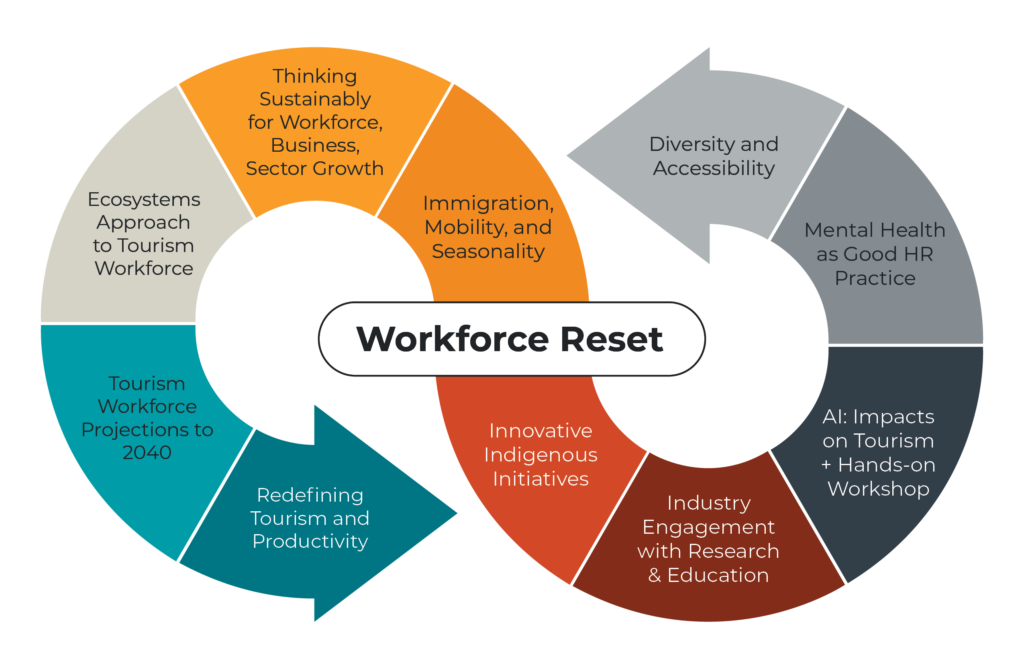
Ecosystems Approach to the Tourism Workforce
Understanding the relationship amongst the tourism community can help us to leverage each other’s strengths, work collaboratively, and project a cohesive message as to the value of Canada’s tourism sector. It also helps to identify past, current, and upcoming initiatives to spot opportunities to build on successes, rather than duplicating efforts.
The Tourism Industry Association of Canada, Hotel Association of Canada, and Restaurants Canada each highlighted their key activities and advocacy work, followed by Tourism HR Canada delving into the connections between associations, industry, governments, education, and labour. Delegates then considered their own ecosystems, noting how their work influences and is in turn influenced by others.
Download the presentations:
Tourism Industry Association of Canada
AI: Impacts on Tourism
While most of us have dabbled in AI in the workplace, many do not feel they know how to use these tools effectively. There is a critical need for training to help staff navigate AI in a safe, productive way. Tourism AI Network led the group through some possible starting points: using AI for routine admin or HR tasks, for marketing, and for augmenting service. Worth noting: in a people-focused industry like tourism, the human element is more important than ever, and AI should be seen as a means to ease the burden in some areas so staff can focus on those that require a personal connection.
Download the presentations:
How to Make AI Your Unfair Business Advantage
Demystifying AI and Enabling Your New Superpowers
Industry Engagement with Research and Education
Labour market intelligence (LMI) research and advocacy relies on engagement with industry. In the past few years, operators and stakeholders have been overwhelmed with research requests and are disengaging. Delegates discussed their experiences and priorities, then suggested where they saw opportunities to collaborate and reduce duplication, provide more consistency in research, and fill research gaps with resources and tools.
Following this was a conversation around the widening gap between training institutions (colleges and universities) and tourism industries. Delegates were asked how we as a collective can better engage with students to increase attachment to the sector when they graduate. From making early links with high schools, such as the newly updated Canadian Academy of Travel and Tourism program, to post-secondary co-op placements, mentorships, job shadowing, and guest speakers, educators and industry have ample opportunities to spark a lasting connection and showcase tourism careers. The Propel Student Work Placement Program featured as a means to connect not only tourism, travel, and hospitality students with careers in the sector, but also those in business admin, marketing, HR, IT, and more.
Learn more about the Canadian Academy of Travel and Tourism
Learn more about the Propel Student Work Placement Program
Diversity and Accessibility
Tourism HR Canada’s Belong project seeks to strengthen tourism’s capacity to offer inclusive, diverse, equitable, accessible, leading (IDEAL) workplaces by increasing the awareness of disability inclusion and enhancing the understanding of the significant benefits of hiring, retaining, and promoting persons with disabilities.
Delegates were provided with a sneak peek at the eLearning and resources being developed to support employers, accompanied by some guided self-reflection and a discussion around ableism, bias, and intersectionality. Valuable associations and resources were highlighted, along with the importance of tailoring programs and advice to the unique needs of tourism businesses—a goal of the upcoming Belong programming.
Learn more about the Belong initiative.
Immigration, Mobility, and Seasonality
While tourism has a host of full-year employment opportunities, seasonal work is of course prevalent across the country and presents a unique set of challenges when it comes to attraction and retention.
The Conseil québécois des ressources humaines en tourisme (CQRHT) dove into the results of recent research and an employment pairing program, wherein businesses in complementary operational periods offered employment to the same individual. CQRHT also shared the outcomes of a seasonal employment conference, which brought together 130 participants from five different sectors with seasonal work opportunities to discuss best practices and ways to collaborate across industries, particularly for jobs requiring transferable skills such as customer service, communications, numeracy, etc. Finally, they presented Boomerang, a new digital job-sharing platform to help with seasonal recruitment.
Next, the Réseau de développement économique et d’employabilité (RDÉE Canada) and Immigration, Refugees and Citizenship Canada (IRCC)’s outreach team set up a conversation around immigration pathways and settlement support services. While the Temporary Foreign Worker program gets much of the press, employers can tap into a number of different streams to hire internationally trained workers. Guidance and resources are available online and by phone, and IRCC also hosts several international recruitment events each year, both virtually and in-person. Case studies demonstrated how the programs can help, including a close look at an asylum seeker integration project in Quebec. Amongst the challenges noted were mobility (urban vs. regional), training, the precarity of the claim process, and part-time or seasonal roles.
Visit Tourism HR Canada’s Immigration Hub
Tourism Workforce Projections to 2040
Tourism HR Canada has long worked closely with the Conference Board of Canada to forecast labour supply and demand. The latest projections show that while demand for talent will continue to steadily increase, the already insufficient supply will continue to trail behind, leaving businesses short-staffed and service levels suffering.
What actions could help lessen the gap? Eliminating negative perceptions of tourism as a career choice, improving working conditions in the sector, and tapping into the variety of programs to connect with foreign talent. Collaboration between industry, associations, and governments is imperative to push these forward.
Download The Future of Canada’s Tourism Sector – Labour Demand and Supply Analysis
Redefining Tourism and Productivity
Productivity is a “return on investment” concept measuring the economic value of goods and services relative to inputs required to produce them. Higher productivity means the economy is producing more value for the same amount of work.
Several factors drive productivity, including technological change, economies of scale, and the skills and abilities of workers. In a service-based sector like tourism, measuring productivity presents some challenges…but data shows that tourism productivity was slowing even before the pandemic, then took a huge hit, and continues to struggle to recover.
An exploration of the Conference Board of Canada’s latest research included a discussion of ways to ramp up productivity in the sector, including increasing investments in skills development, reducing turnover, and encouraging innovation.
Thinking Sustainably for Workforce, Business, Sector Growth
Guided by GreenStep, participants undertook an action planning process, reflecting on how they and their organizations can contribute positively to their local communities and consider how to leverage sustainability practices to position tourism as a desirable sector for employment. Using shared frameworks like the United Nations Sustainable Development Goals, they considered and shared ways to operate symbiotically with the community, employees, visitors, and the natural world.
Tourism HR Canada’s Common Ground committee served as an example of how an organization can proceed from the initial creation of a sustainability team through to real, measurable action both internally and externally. The committee has guided the organization from taking the Sustainable Tourism 2030 Pledge to a remarkable 31% improvement in its score in just one year.
Learn about Common Ground’s success
Innovative Indigenous Initiatives
A panel discussion with tourism leaders from Indigenous Tourism BC, Indigenous Tourism Alberta, and Indigenous Tourism Ontario delved into opportunities and challenges facing Indigenous tourism, especially in light of growing demand for authentic experiences.
Programming has supported growth on the product side, but more can be done to ensure all operators have access to the resources and the talent needed to become export ready and showcase that they offer an authentic product. Key to this: encouraging Indigenous individuals to pursue tourism as a career option, with Indigenous-led initiatives that link what tourism employment offers with what individuals and communities seek from employment opportunities.
Further, these connections need not be limited to Indigenous tourism businesses: all tourism employers should be equipped to engage Indigenous job seekers, offering culturally appropriate attraction and retention practices and workplaces.
With a rapidly growing population, and with Indigenous tourism representing an important pathway towards reconciliation, Indigenous peoples are a vital part of the tourism workforce. Nevertheless, they remain underrepresented in the labour market. Working in respectful partnership with Indigenous tourism organizations and the wider community will facilitate necessary changes.
Visit Indigenous Tourism Alberta
Visit Indigenous Tourism Ontario
Explore Pathways to Indigenous Market Readiness
Download the Indigenous Engagement Handbook
Mental Health as Good HR Practice
Continuing to gain much-needed attention and resources, mental health in the workplace—also referred to as psychological health and safety—is a fundamental component of good HR. One in five Canadians experience a mental health problem each year, and it is unacceptable to expect them to simply set this aside when they arrive at work.
Creating a workplace that is safe physically and psychologically means that employees have the tools, resources, training, and support to do their work, to the best of their abilities, while bringing their whole self to work.
British Columbia’s go2HR joined Tourism HR Canada to highlight key considerations, share results from recent research and survey work, and engage in discussion around what information and supports employers and staff need and where to access them.
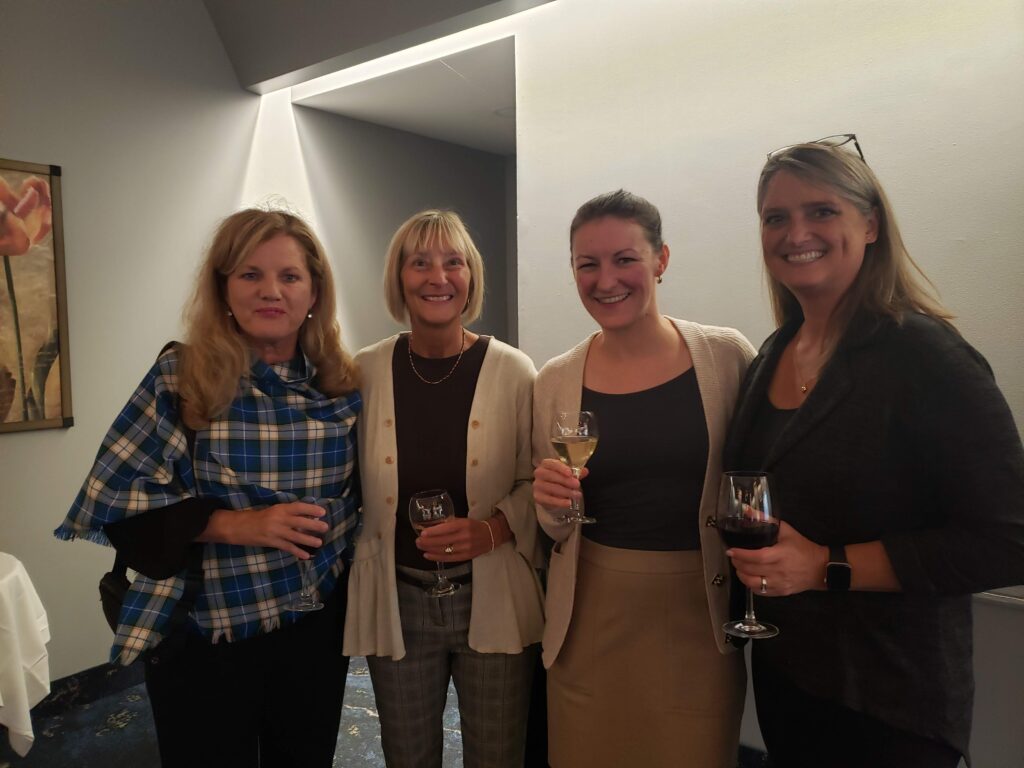




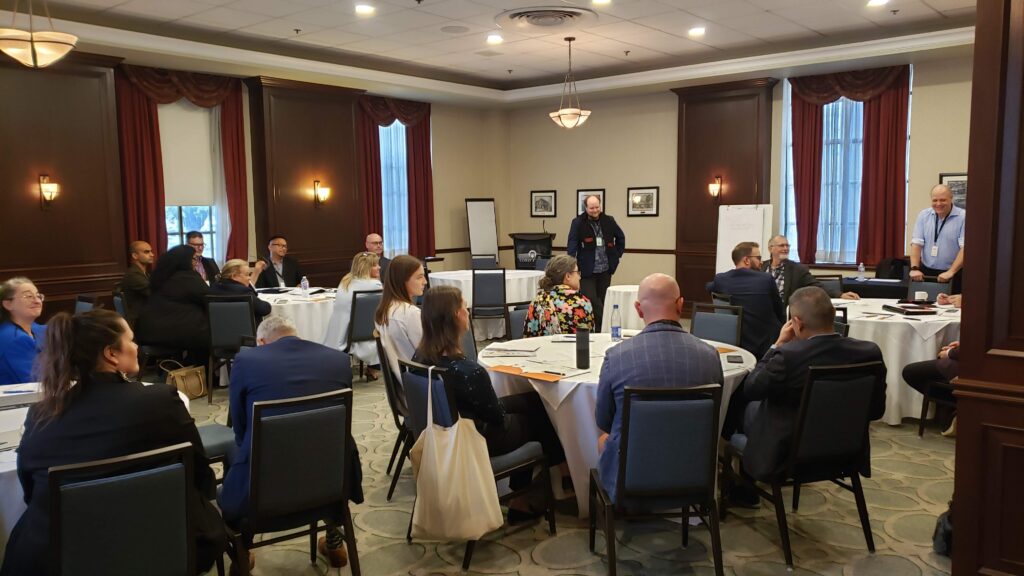
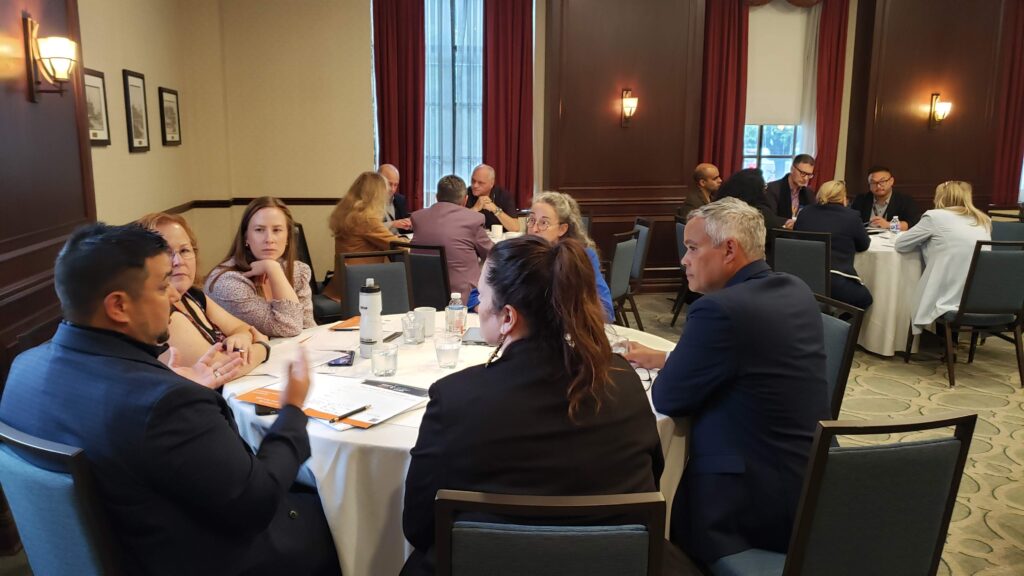

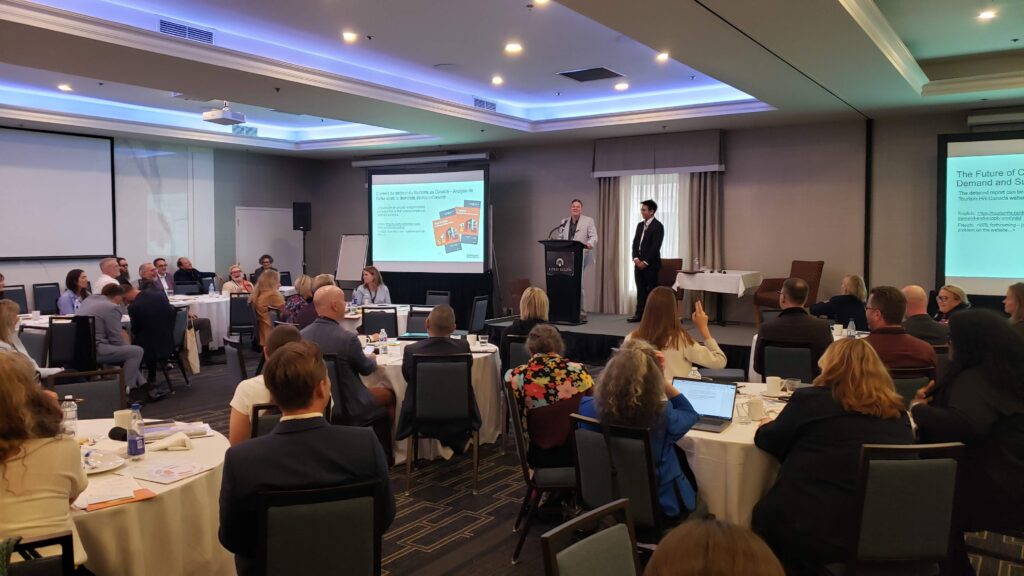
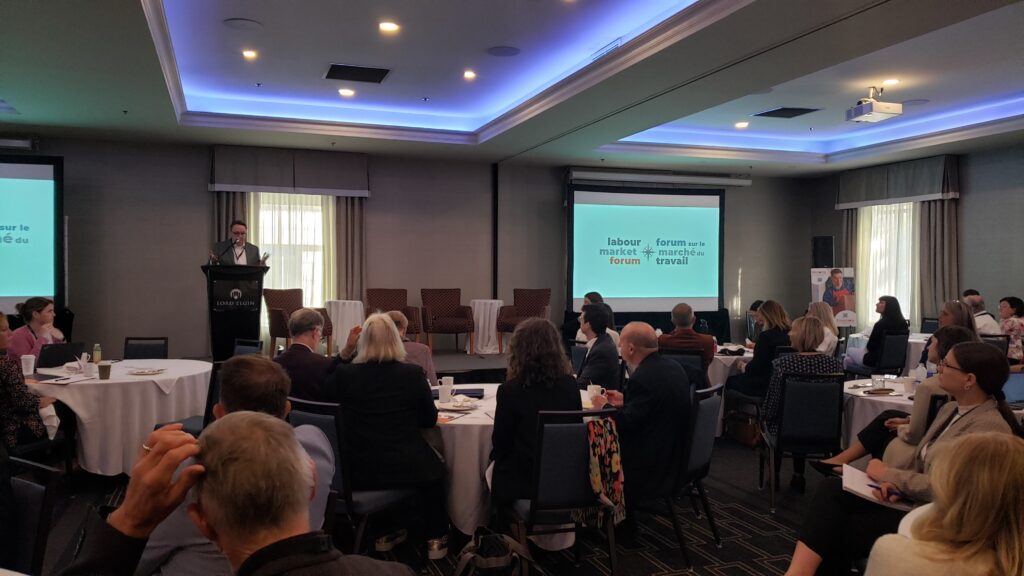
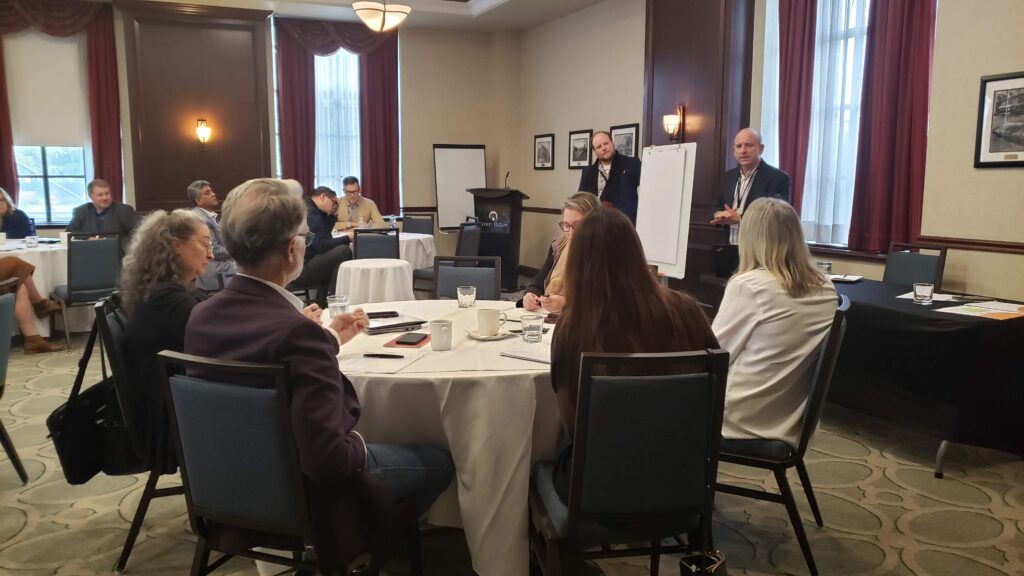

Tourism HR Canada thanks Economic and Social Development Canada (ESDC) for its funding and support of this event.
To our participants, we’re grateful to you all for sharing your perspectives, as they help us to ensure Tourism HR Canada is focused on the issues of importance to our tourism community.
A special thanks to our speakers for their expertise and enthusiasm, and to Minister Martinez Ferrada and Minister Boissonnault for sharing their valuable time and highlighting not only the work the government is doing to support the tourism sector, but the need for amplified career awareness.
As a token of appreciation, Tourism HR Canada made a donation to the to the Rick Hansen Foundation on behalf of each speaker.
